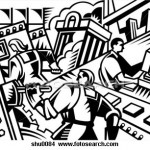
It should not be any surprise that a June 2013 Gallup poll finds that a majority of workers don’t like their jobs, the accompanying workplace stress and working conditions.
These poll results are expected because workers have not received wages increases for the past few decades, nor benefited from the greater recent productivity gains and record corporate profits posted by many of America’s largest corporations since the end of the 2008 recession.
In addition to the Gallup results posted in the chart below, the survey found workers also are not satisfied with their employer’s retirement plans, chances for promotion, and health benefits. No more than 35% of workers are satisfied with each of these, the poll found.
These are critical workplace factors. After all, what else are people working for?
Earlier workplace studies have fund that most people go to work for emotional satisfaction (the chance to contribute to something positive and be recognized via a promotion), as well as the material comforts of benefits and retirement.
But the 2008 recession has fundamentally changed the employer-employee relationship. While you would not know that reading and watching the big media outlets, everything is not running smoothly in the American workplace.
The recession exposed the different workplace priorities and these were only aggravated by Libertarian and conservative Republican discussions about the need to privatize Social Security and eliminate the minimum wage. The ongoing, rear-guard battle against the new health care legislation has only made working conditions more uncertain and unpleasant.
The results also display the Fed’s quietly stated goal of preventing workers from receiving wage increases.

As stated by Alan Greenspan, wage increases only flag inflation, so discouraging wage gains is better for the economy than inflation. He did not explain, however, the long-term effects of as stagnant wage base and its effects on a consumer economy.
The Gallup Poll Results
(poll conducted August 9-12, 2012, adults employed full-and part-time)











